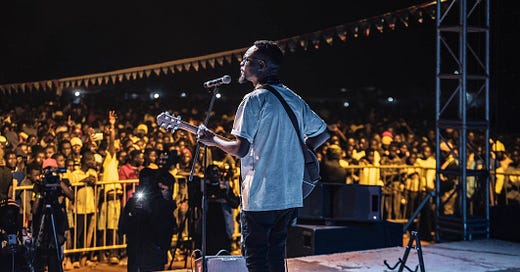Tumaini at 10
Malawi doesn’t let displaced foreigners integrate. So the residents of its only refugee camp hold a festival each year to celebrate their cultures together.
Jack McBrams in Dowa, Malawi
Before 1994, Dzaleka was a political prison. The site, about 50km outside Lilongwe, has since grown into Malawi’s largest and only permanent refugee camp. It’s a sprawling symbol of the country’s controversial encampment policy, which bars displaced non-citizens from integrating into local society, schools or job markets.
Once a year, for 10 years now, it becomes a site for joy, talent and multicultural celebration.
“We look forward to Tumaini all year,” says Michelle, a Burundian refugee who has lived in the camp for 22 years. “It reminds us of our culture, our joy, and everything we left behind. People here deal with unimaginable hardship, but Tumaini gives us hope. It’s a glimpse of a better tomorrow.”
The Tumaini festival was founded in 2014 by Congolese artist Menes La Plume, and born of his own displacement journey. The hip-hop artist, writer, and slam poet fled the Democratic Republic of Congo after his art put him at odds with authorities. “I had to escape, but I didn’t leave behind my desire to use words and music to open minds,” he says.
Across three days, the festival features multiple stages, an area for visual art displays, an outdoor cinema, a children’s playground, workshops and speaking panels.
The star of this year’s festival was Jetu, the 72-year-old singer and social media star who became a sensation last year when she followed her grandchildren’s lead and started making skits for TikTok and YouTube.
Reprising the catchy tunes that launched her late bloom, Jetu stole the show on the festival’s closing night.
“At my age, not many people get this chance,” she told The Continent, thrilled to have travelled over 400km to perform.

Drawn in by the festival’s good cause, South African musician Maveriq Mavo also performed this year, saying: “Some things aren’t about money; they’re about purpose. I wrote a song dedicated to the refugees here.”
Pulling the festival off is a tremendous feat – this year’s crowdfunding campaign raised only $400 of the $10,000 sought.
But it does “open minds” as La Plume intended.
“This is the one time each year that we can come together, Malawians and refugees. People here are like anyone else – they have dreams, talents, and a love for life. The festival shows that,” said Malawian festival-goer Yasintha Kanyoza.
And La Plume now hopes to expand its vision to other African countries. “Tumaini has grown into more than a festival,” he said. “It’s a movement for economic, cultural, and psychological empowerment for refugees. Many of us now feel a sense of belonging and mental clarity because of this festival.”





